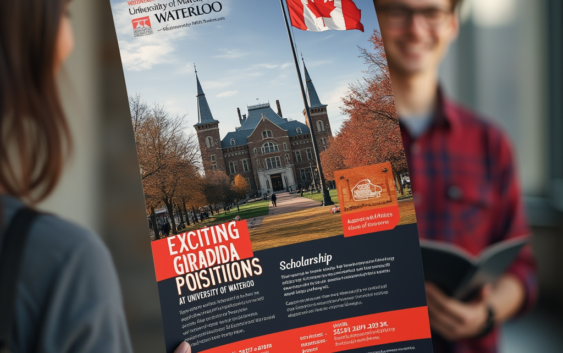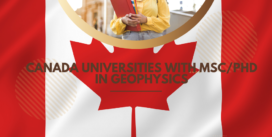- Warehouse Jobs in Singapore with Visa Sponsorship: Your Ultimate Guide to a Thriving Career
- Step-by-Step Guide on How to Apply for New Zealand International Teacher’s Immigration Pathway: Eligibility, Documents Needed, and Job Websites with a $10,000 NZD Package
- New Zealand International Teachers Pathway: Eligibility and Application Guide
- Find Caregiver Positions with German Visa Sponsorship
- Farm Worker Visa Sponsorship in Finland
Exciting Graduate Positions at University of Waterloo

Are you eager to dive into groundbreaking research and make a significant impact in the field of computational science? The University of Waterloo offers exciting graduate positions in a stimulating academic environment, where innovation and cutting-edge research thrive. These opportunities are ideal for passionate individuals looking to pursue a Master’s or Doctoral degree while working on challenging projects that advance scientific understanding and technology. The graduate positions span across diverse disciplines, providing a broad array of research avenues for enthusiastic candidates. Joining the University of Waterloo means becoming part of a community committed to academic excellence and innovation, offering a collaborative and dynamic setting for your advanced studies.
Application and Program Details
The University of Waterloo invites applications for MSc and PhD programs across various disciplines, including computational physics, applied mathematics, chemical engineering, mechanical engineering, materials engineering, electrochemistry, artificial intelligence, computer science, and chemistry. These positions offer a unique opportunity to engage in innovative research projects that push the boundaries of scientific knowledge and technological advancements. Prospective students have the flexibility to apply at their convenience, as the positions will remain open until filled. Each program combines rigorous academic coursework with practical, hands-on research, providing a comprehensive educational experience. The interdisciplinary nature of these positions fosters a collaborative environment, ideal for candidates eager to work on challenging and impactful research projects. Applicants should be prepared to immerse themselves in a vibrant academic setting, surrounded by experts dedicated to advancing their respective fields.
Position 1: Electrochemical Systems
This position involves developing dynamic density functional theory (DDFT)-based models to study interfacial reaction-diffusion processes in electrochemical systems. The research focuses on understanding transport phenomena at the electrolyte-electrode interface, which has practical implications for corrosion prevention and the development of electric double-layer capacitors. Candidates should have a solid background in computational physics or chemistry, be proficient in partial differential equations, and have experience with machine learning techniques. Familiarity with DFT, DDFT, or electrochemical modeling will be highly advantageous, enabling the candidate to contribute effectively to this cutting-edge research area.
Position 2: Tissue Dynamics
The second exciting position involves developing dynamic density functional theory (DDFT)-based models to explore tissue dynamics. This research focuses on incorporating features such as proteins and membrane deformations to study nanoscale biological processes, including intracellular signaling and tissue morphogenesis. By integrating physics-informed machine learning, the project aims to unravel complex biological mechanisms at the cellular level. Ideal candidates should have a background in computational biology, biophysics, or applied mathematics. Experience with partial differential equations, multiscale modeling, or molecular dynamics simulations will be highly beneficial. This position offers a unique opportunity to contribute to pioneering research that bridges physics and biology, advancing our understanding of tissue dynamics.
Candidate Qualifications
Ideal candidates will have strong programming skills in languages such as Python, C++, or Julia. Experience with computational modeling frameworks and machine learning tools is essential. Applicants should be adept at using these tools to tackle complex scientific problems. A background in computational physics, chemistry, biology, or applied mathematics is highly desirable, especially if it includes experience with partial differential equations, dynamic density functional theory (DDFT), or other advanced modeling techniques.
The ability to work both independently and collaboratively in a team environment is crucial. Successful candidates should demonstrate a proven track record of effective problem-solving and innovative thinking. Additionally, familiarity with multiscale modeling, molecular dynamics simulations, or electrochemical modeling will provide a significant advantage in these roles. Strong analytical skills and the capability to engage deeply with interdisciplinary research projects are also important.
Application Process
To apply for these exciting graduate positions, prospective candidates should prepare a comprehensive academic CV detailing their educational background, research experiences, and relevant skills. Additionally, applicants must include a brief statement of research interests, highlighting their motivation and the specific areas they are passionate about within the scope of the offered projects. This statement should clearly articulate how their background and interests align with the research goals of the positions.
Applicants should also provide contact information for at least two academic or professional references who can speak to their qualifications and suitability for the positions. These references will be contacted to provide insight into the candidate’s research abilities, collaborative skills, and overall potential for success in the graduate programs.
All application materials should be sent via email to Dr. Conrad Giresse Tetsassi Feugmo at cgtetsas@uwaterloo.ca
It is recommended to format the email subject line to clearly indicate the application for the graduate position and specify the area of interest, whether it be Electrochemical Systems or Tissue Dynamics. This will ensure that the application is processed efficiently.
Candidates are encouraged to reach out to Dr. Feugmo with any specific questions regarding the research projects or the application process. This is a fantastic opportunity to join a dynamic research group at the University of Waterloo and engage in groundbreaking research that pushes the boundaries of scientific knowledge and technological innovation.

